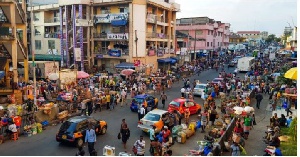 Some economists are worried that political stand-offs will threaten the country's economic rebound
Some economists are worried that political stand-offs will threaten the country's economic rebound
Local businesses are setting a good example in downplaying the possible effects of the ongoing political imbroglio brought about by the contesting, by the opposition National Democratic Congress, of the election results declared by the Electoral Commission.
So far the multinational corporations are following their lead, expressing confidence that the ongoing political tensions will be resolved amicably in short time rather than escalate into debilitating civil strife.
Nevertheless, some economists are worried that the political standoff between the two major political parties is threatening the economic rebound begun in late June after the effects of the COVID-19 outbreak and the requisite public policy responses generated an unprecedented 3.2 per cent contraction (measured year on year) of the economy for the third quarter of 2020.
Data compiled by the Bank of Ghana has pointed to a strong economic recovery since the start of the third quarter but this could possible be curtailed by renewed business uncertainty following the political turmoil that has erupted following the official declaration of the results of the December 7 general elections.
Not only has the NDC secured enough seats in Parliament to make passing of legislation by the ruling – and officially re-elected – New Patriotic Party extremely difficult, from next year, but the NDC is refusing to accept defeat in the presidential poll as well.
On Sunday, protests in both the Greater Accra and Northern regions erupted, raising the spectre of extended civil strife that could very well disrupt business and other socio-economic activity. Some of the major multinational corporations in Ghana have started urgent discussions with their respective regional and global headquarters as to their best line of action in the face of possible civil disobedience and even outright violence but so far corporations in Ghana are hopeful that the situation will be resolved before it gets out of hand, Local executives of such multinationals are pointing to the confident stance of their indigenous business counterparts as evidence that the situation is still well under control.
However, plans to commence major new capital investments are being put on hold again. Some of those investments have been pending since respective board approvals were granted during the third quarter of this year, with COVID 19 cases apparently in decline, but implementation had been suspended till after the elections.
Now the elections have come and gone but political uncertainties – and resultant accompanying economic uncertainties have intensified in their aftermath because of the emergent political stand-off.
Corporate chieftains are hoping that the political dispute will be referred to the law courts for adjucation but fret that low level supporters of the two major political parties may start clashing on the streets through demonstrations and counter-demonstrations. This fear is threatening both business and consumer confidence.
These worries are being accompanied by worries that public policy efforts to curb a second wave of COVID-19 infections, that data suggested had started by mid- November, have been put on the back-burner because of the electoral dispute.
Corporate Ghana executives fear that Ghana’s upwardly revised growth projections for 2020 – put at two percent by the Bank of Ghana in its estimates made in September – may not be achieved because political uncertainties could conceivably slow economic activity up to Christmas, by which time many formal sector businesses customarily close down to join the end of year festivities.
However, both government officials and NDC executives continue to assure that this is just a storm in a teacup caused by a few unruly grass-root political supporters and some hooligans who are seeking to take advantage of the situation for their own gain. Indeed so far the security agencies have had a handle on the situation with insignificantly few reports of loss of property resulting from the protests.